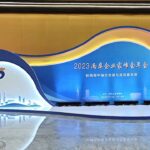China’s production of manufacturing equipment for areas such as chips and artificial intelligence (AI) is growing rapidly, with the added value of the manufacturing sector for special equipment for semiconductors recording a significant increase in October, a Chinese official said on Wednesday, a further sign of China’s thriving chipmaking tool manufacturing sector amid relentless crackdowns by the US government.
Despite US officials’ repeated claims that they’re not seeking to contain China during recent talks with Chinese officials, a US government agency has hinted at further intensifying restrictions on the sales of chipmaking tools to China, according to media reports.
Chinese analysts said that the ill-conceived, arbitrary US restrictions have spurred Chinese companies to bolster their capabilities, and doubling down on this lose-lose approach will not help any party and would further spur Chinese firms to strive for self-reliance. Furthermore, such curbs won’t stop businesses, including those from the US, to seek profits from win-win cooperation.
At a press conference on economic operations in Beijing in October , Liu Aihua, a spokesperson for the National Bureau of Statistics, said that new growth engines for the Chinese economy are expanding, pointing to rapid growth in the production of equipment in related fields.
Specifically, the added value of the manufacturing sector of special equipment for semiconductor devices jumped by 33.9 percent in October, according to Liu.
The rise of China’s semiconductor equipment manufacturing sector is reflected in the soaring revenues of major companies. According to China Finance Online, the operating income of the semiconductor equipment sector in the first three quarters of 2023 reached 33.652 billion yuan, a year-on-year increase of 31.14 percent.
“With demand recovering and inventories improving, localization of semiconductor equipment is likely to exceed expectations,” the report said.
While China’s chipmaking tool manufacturing capabilities still have far to go to catch up with other countries such as the US, there is a sense of urgency for faster progress in bolstering China’s capabilities, due to ever-intensifying US restrictions, Chinese analysts said.
“With ‘pressure’ from the US, China continues to strive for breakthroughs in the semiconductor field, and Chinese companies are seeking to use Chinese-made chips in their products,” Xiang Ligang, the director-general of the Beijing-based Information Consumption Alliance who closely follows the chip industry, told the Global Times on Wednesday.
After many measures seeking to ban sales of advanced chips and chipmaking tools to China, including a sweeping executive order signed by US President Joe Biden last month, a US government agency has hinted at further crackdowns.
The US-China Economic and Security Review Commission said in an annual report that Chinese firms were buying up US chipmaking equipment to make advanced semiconductors despite the US curbs, while taking aim at Biden’s latest executive order, according to a Reuters report on Wednesday.
The report said that China imported $3.2 billion worth of semiconductor manufacturing machines from the Netherlands, a 96.1 percent increase year-on-year. While the report did not include specific policy recommendations, it urged the US Congress to request an annual evaluation.
To Chinese analysts, the report adds to growing signs that the US government will likely further tighten its crackdowns; however, the effect of such measures won’t help the US achieve its goal of containing China’s rise, without hurting its own chip firms first.
“Relevant US government departments have tightened export restrictions time and again, but US chip companies time and again try to find ways to export products to China,” Xiang said, noting that such restrictions seriously hurt US chip firms’ revenues, costs and research and development capabilities.
While US officials have repeatedly stated that they were not seeking to decouple the Chinese and US economies or contain China’s development, they also reiterated that the US seeks “healthy competition” and protects its “national security” – euphemism for its crackdowns.
Such rhetoric has exacerbated concerns about more US restrictions in the semiconductor trade that will hurt all parties, including the US itself.
“Instead of suppressing and ostracizing China continuously, the US should think carefully about how to communicate with China and stabilize ties with China, because that is actually in the interests of both countries, as well as the world,” Mei Xinyu, a research fellow at the Chinese Academy of International Trade and Economic Cooperation, told the Global Times.
(Global Times)




